Reflective Analysis of MGT600 Modules: Management, People & Teams
VerifiedAdded on 2022/10/09
|6
|1047
|46
Report
AI Summary
This reflective analysis examines the introductory content of the MGT600 course, focusing on the nature of organizations, the role of management, motivation, influence, communication, conflict, and negotiation. The analysis explores how the student's understanding of these topics has evolved, highlighting the application of theories such as contingency theory, Maslow’s Need Hierarchy Theory, and communication models. The report emphasizes the relevance of these concepts to the student's workplace experiences and outlines strategies for applying the learned theories to analyze organizational environments, resolve conflicts, and manage workforce diversity. The conclusion summarizes the key takeaways, emphasizing the practical application of the course content to enhance the student's management skills and address real-world challenges.
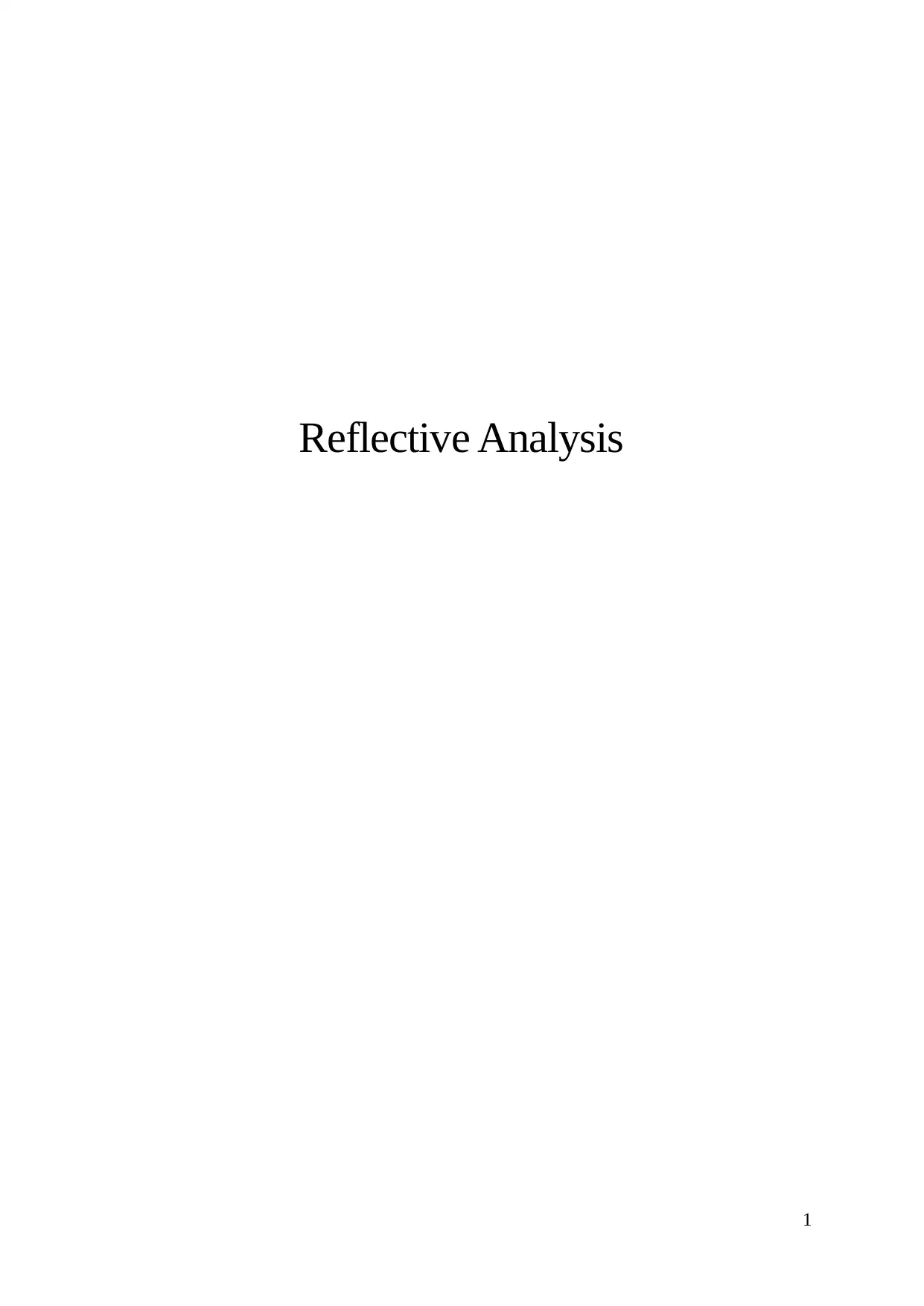
Reflective Analysis
1
1
Paraphrase This Document
Need a fresh take? Get an instant paraphrase of this document with our AI Paraphraser
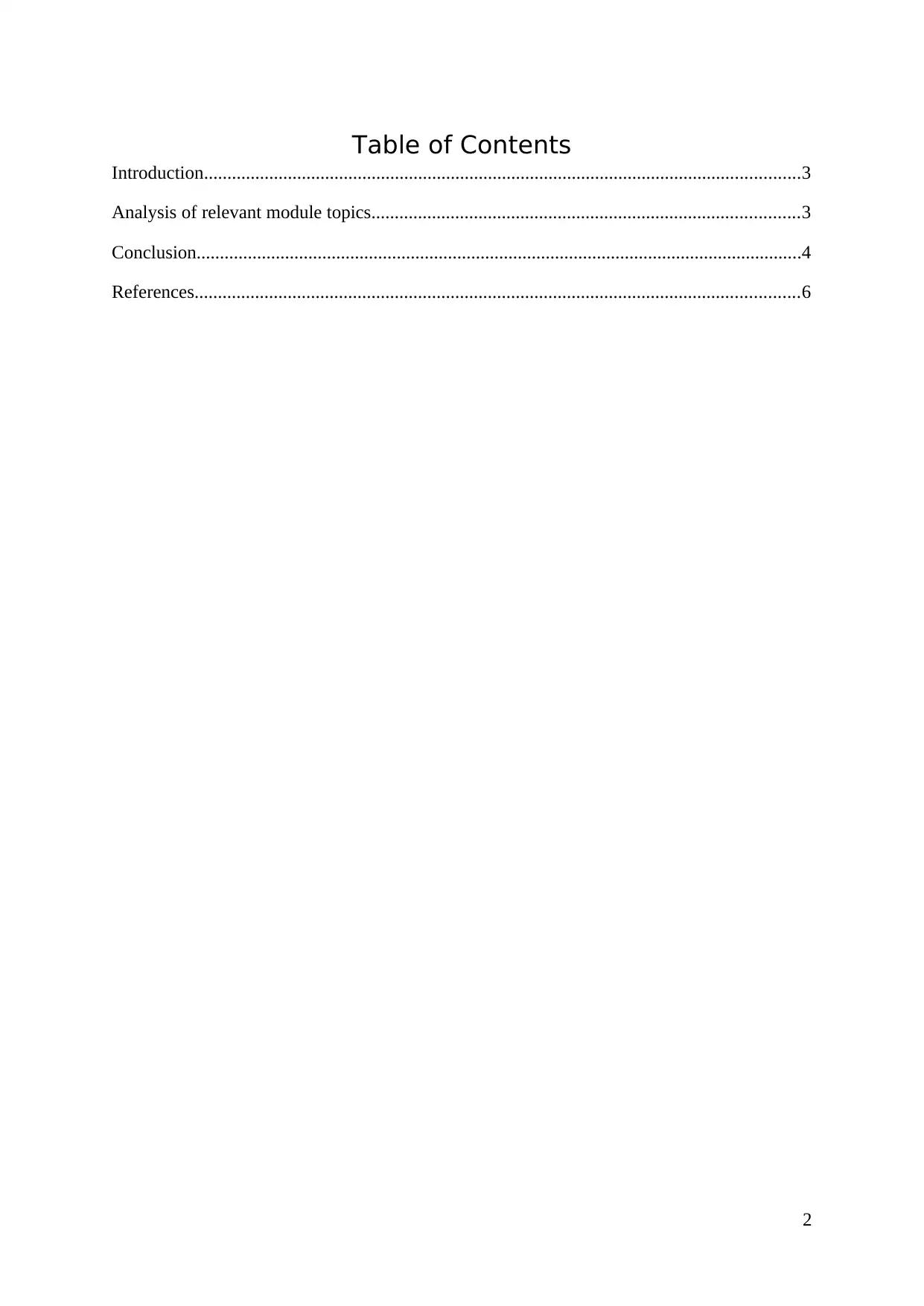
Table of Contents
Introduction................................................................................................................................3
Analysis of relevant module topics............................................................................................3
Conclusion..................................................................................................................................4
References..................................................................................................................................6
2
Introduction................................................................................................................................3
Analysis of relevant module topics............................................................................................3
Conclusion..................................................................................................................................4
References..................................................................................................................................6
2
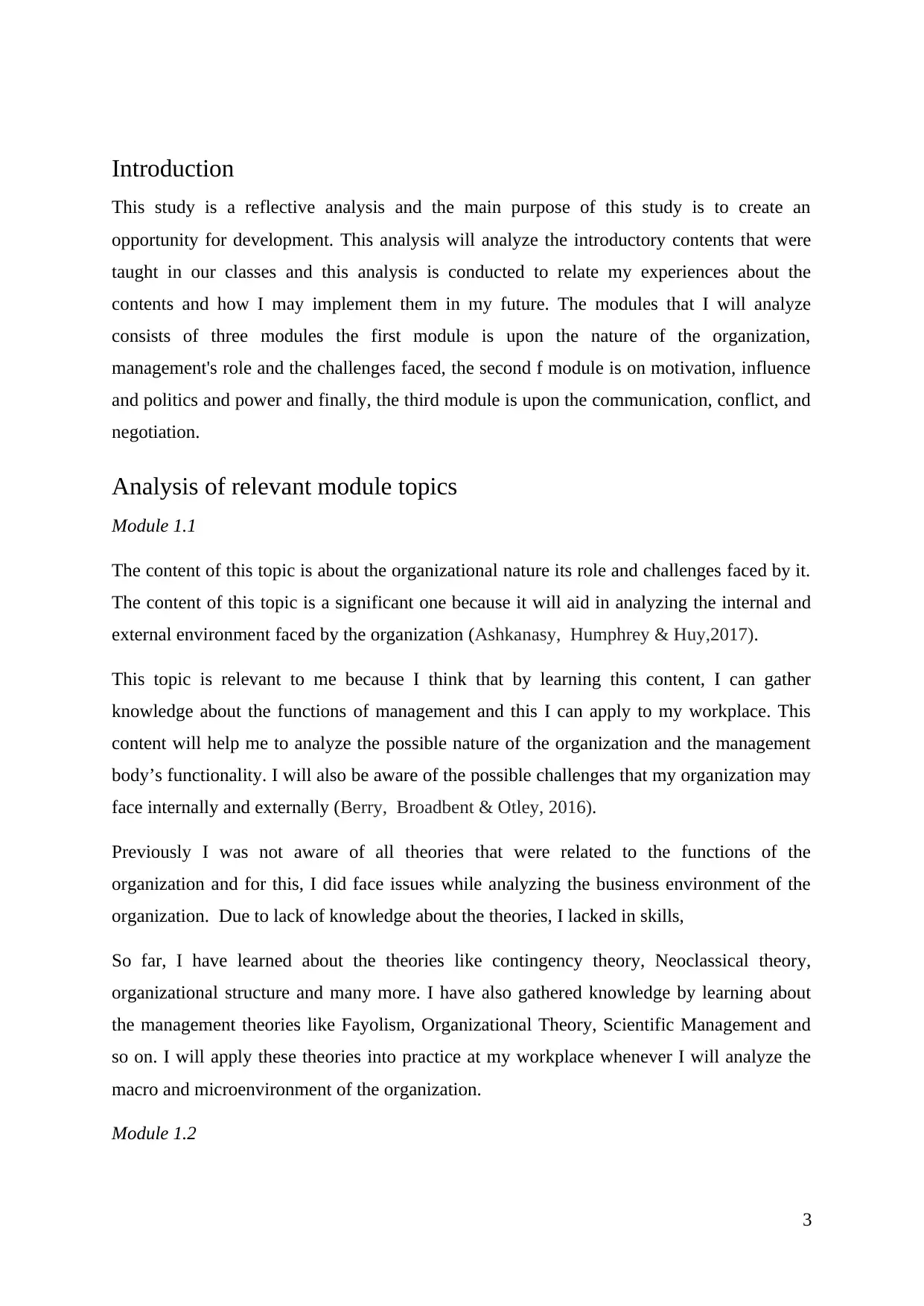
Introduction
This study is a reflective analysis and the main purpose of this study is to create an
opportunity for development. This analysis will analyze the introductory contents that were
taught in our classes and this analysis is conducted to relate my experiences about the
contents and how I may implement them in my future. The modules that I will analyze
consists of three modules the first module is upon the nature of the organization,
management's role and the challenges faced, the second f module is on motivation, influence
and politics and power and finally, the third module is upon the communication, conflict, and
negotiation.
Analysis of relevant module topics
Module 1.1
The content of this topic is about the organizational nature its role and challenges faced by it.
The content of this topic is a significant one because it will aid in analyzing the internal and
external environment faced by the organization (Ashkanasy, Humphrey & Huy,2017).
This topic is relevant to me because I think that by learning this content, I can gather
knowledge about the functions of management and this I can apply to my workplace. This
content will help me to analyze the possible nature of the organization and the management
body’s functionality. I will also be aware of the possible challenges that my organization may
face internally and externally (Berry, Broadbent & Otley, 2016).
Previously I was not aware of all theories that were related to the functions of the
organization and for this, I did face issues while analyzing the business environment of the
organization. Due to lack of knowledge about the theories, I lacked in skills,
So far, I have learned about the theories like contingency theory, Neoclassical theory,
organizational structure and many more. I have also gathered knowledge by learning about
the management theories like Fayolism, Organizational Theory, Scientific Management and
so on. I will apply these theories into practice at my workplace whenever I will analyze the
macro and microenvironment of the organization.
Module 1.2
3
This study is a reflective analysis and the main purpose of this study is to create an
opportunity for development. This analysis will analyze the introductory contents that were
taught in our classes and this analysis is conducted to relate my experiences about the
contents and how I may implement them in my future. The modules that I will analyze
consists of three modules the first module is upon the nature of the organization,
management's role and the challenges faced, the second f module is on motivation, influence
and politics and power and finally, the third module is upon the communication, conflict, and
negotiation.
Analysis of relevant module topics
Module 1.1
The content of this topic is about the organizational nature its role and challenges faced by it.
The content of this topic is a significant one because it will aid in analyzing the internal and
external environment faced by the organization (Ashkanasy, Humphrey & Huy,2017).
This topic is relevant to me because I think that by learning this content, I can gather
knowledge about the functions of management and this I can apply to my workplace. This
content will help me to analyze the possible nature of the organization and the management
body’s functionality. I will also be aware of the possible challenges that my organization may
face internally and externally (Berry, Broadbent & Otley, 2016).
Previously I was not aware of all theories that were related to the functions of the
organization and for this, I did face issues while analyzing the business environment of the
organization. Due to lack of knowledge about the theories, I lacked in skills,
So far, I have learned about the theories like contingency theory, Neoclassical theory,
organizational structure and many more. I have also gathered knowledge by learning about
the management theories like Fayolism, Organizational Theory, Scientific Management and
so on. I will apply these theories into practice at my workplace whenever I will analyze the
macro and microenvironment of the organization.
Module 1.2
3
⊘ This is a preview!⊘
Do you want full access?
Subscribe today to unlock all pages.

Trusted by 1+ million students worldwide
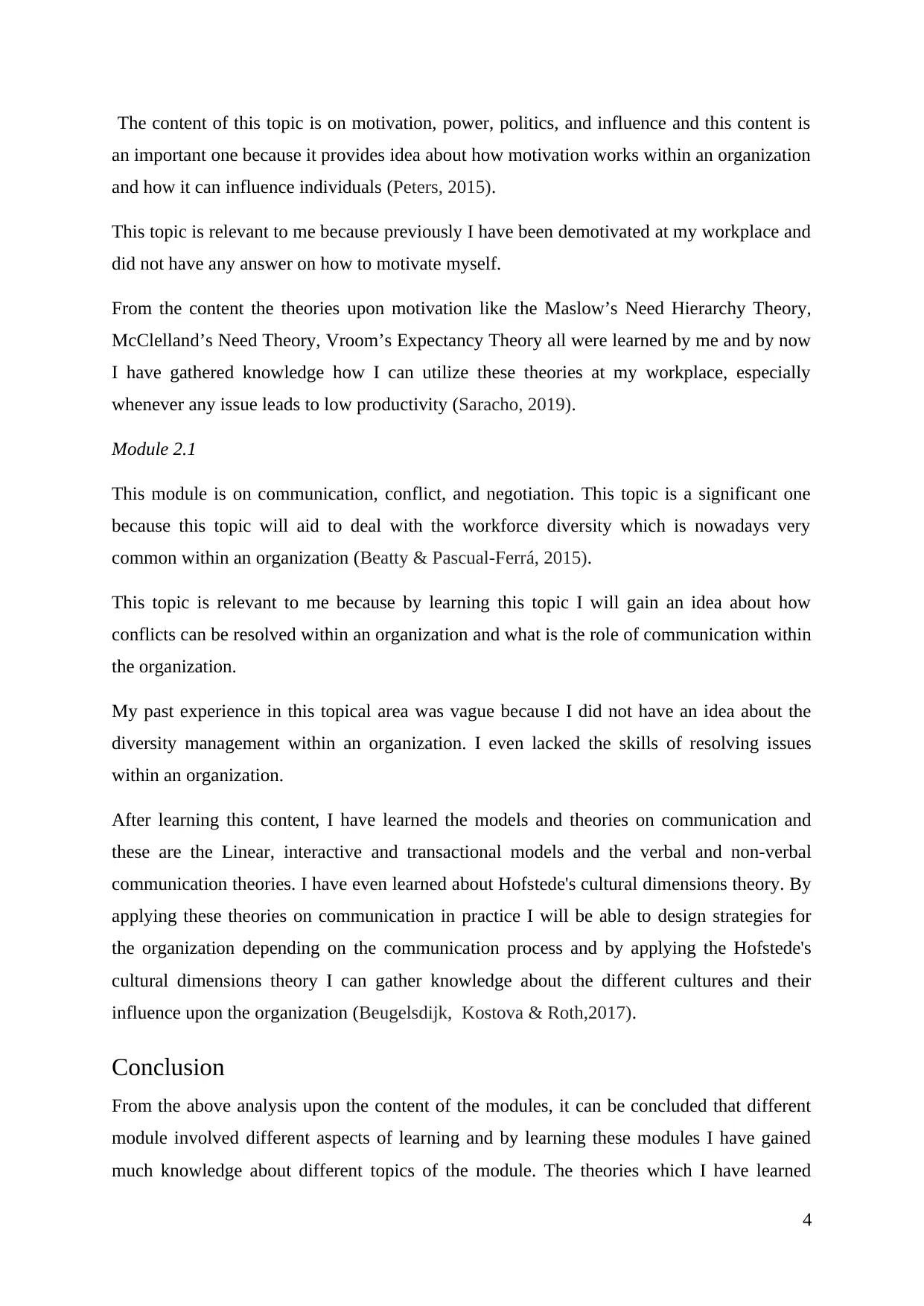
The content of this topic is on motivation, power, politics, and influence and this content is
an important one because it provides idea about how motivation works within an organization
and how it can influence individuals (Peters, 2015).
This topic is relevant to me because previously I have been demotivated at my workplace and
did not have any answer on how to motivate myself.
From the content the theories upon motivation like the Maslow’s Need Hierarchy Theory,
McClelland’s Need Theory, Vroom’s Expectancy Theory all were learned by me and by now
I have gathered knowledge how I can utilize these theories at my workplace, especially
whenever any issue leads to low productivity (Saracho, 2019).
Module 2.1
This module is on communication, conflict, and negotiation. This topic is a significant one
because this topic will aid to deal with the workforce diversity which is nowadays very
common within an organization (Beatty & Pascual‐Ferrá, 2015).
This topic is relevant to me because by learning this topic I will gain an idea about how
conflicts can be resolved within an organization and what is the role of communication within
the organization.
My past experience in this topical area was vague because I did not have an idea about the
diversity management within an organization. I even lacked the skills of resolving issues
within an organization.
After learning this content, I have learned the models and theories on communication and
these are the Linear, interactive and transactional models and the verbal and non-verbal
communication theories. I have even learned about Hofstede's cultural dimensions theory. By
applying these theories on communication in practice I will be able to design strategies for
the organization depending on the communication process and by applying the Hofstede's
cultural dimensions theory I can gather knowledge about the different cultures and their
influence upon the organization (Beugelsdijk, Kostova & Roth,2017).
Conclusion
From the above analysis upon the content of the modules, it can be concluded that different
module involved different aspects of learning and by learning these modules I have gained
much knowledge about different topics of the module. The theories which I have learned
4
an important one because it provides idea about how motivation works within an organization
and how it can influence individuals (Peters, 2015).
This topic is relevant to me because previously I have been demotivated at my workplace and
did not have any answer on how to motivate myself.
From the content the theories upon motivation like the Maslow’s Need Hierarchy Theory,
McClelland’s Need Theory, Vroom’s Expectancy Theory all were learned by me and by now
I have gathered knowledge how I can utilize these theories at my workplace, especially
whenever any issue leads to low productivity (Saracho, 2019).
Module 2.1
This module is on communication, conflict, and negotiation. This topic is a significant one
because this topic will aid to deal with the workforce diversity which is nowadays very
common within an organization (Beatty & Pascual‐Ferrá, 2015).
This topic is relevant to me because by learning this topic I will gain an idea about how
conflicts can be resolved within an organization and what is the role of communication within
the organization.
My past experience in this topical area was vague because I did not have an idea about the
diversity management within an organization. I even lacked the skills of resolving issues
within an organization.
After learning this content, I have learned the models and theories on communication and
these are the Linear, interactive and transactional models and the verbal and non-verbal
communication theories. I have even learned about Hofstede's cultural dimensions theory. By
applying these theories on communication in practice I will be able to design strategies for
the organization depending on the communication process and by applying the Hofstede's
cultural dimensions theory I can gather knowledge about the different cultures and their
influence upon the organization (Beugelsdijk, Kostova & Roth,2017).
Conclusion
From the above analysis upon the content of the modules, it can be concluded that different
module involved different aspects of learning and by learning these modules I have gained
much knowledge about different topics of the module. The theories which I have learned
4
Paraphrase This Document
Need a fresh take? Get an instant paraphrase of this document with our AI Paraphraser

from these modules, I will use them at my workplace and I think that information from these
modules will aid me to apply all my learning into reality. Now after learning these modules, I
am aware of the fact how to analyze the business environment of an organization, how to
resolve issues within the organization and how to learn about a culture and manage workforce
diversity.
5
modules will aid me to apply all my learning into reality. Now after learning these modules, I
am aware of the fact how to analyze the business environment of an organization, how to
resolve issues within the organization and how to learn about a culture and manage workforce
diversity.
5
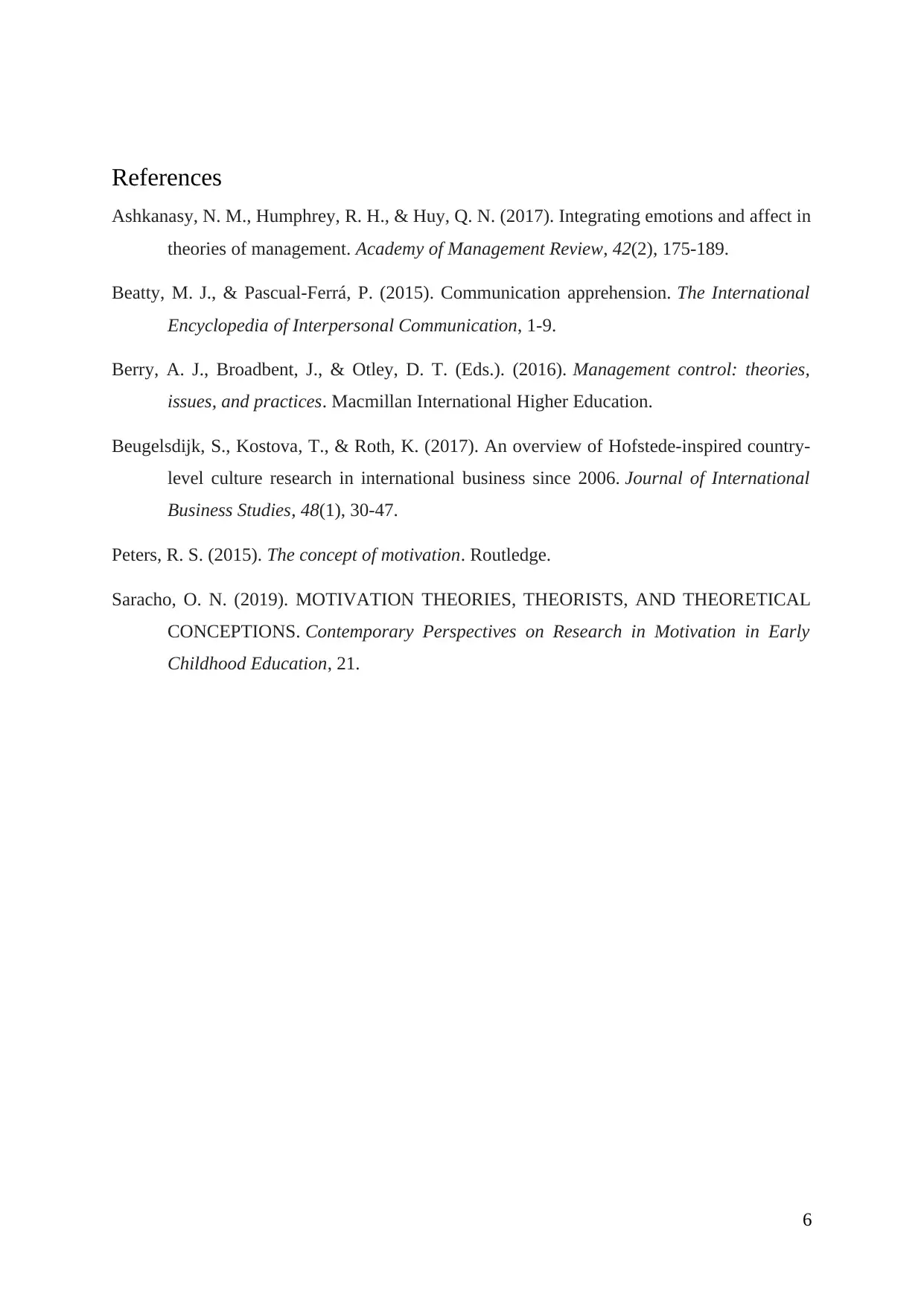
References
Ashkanasy, N. M., Humphrey, R. H., & Huy, Q. N. (2017). Integrating emotions and affect in
theories of management. Academy of Management Review, 42(2), 175-189.
Beatty, M. J., & Pascual‐Ferrá, P. (2015). Communication apprehension. The International
Encyclopedia of Interpersonal Communication, 1-9.
Berry, A. J., Broadbent, J., & Otley, D. T. (Eds.). (2016). Management control: theories,
issues, and practices. Macmillan International Higher Education.
Beugelsdijk, S., Kostova, T., & Roth, K. (2017). An overview of Hofstede-inspired country-
level culture research in international business since 2006. Journal of International
Business Studies, 48(1), 30-47.
Peters, R. S. (2015). The concept of motivation. Routledge.
Saracho, O. N. (2019). MOTIVATION THEORIES, THEORISTS, AND THEORETICAL
CONCEPTIONS. Contemporary Perspectives on Research in Motivation in Early
Childhood Education, 21.
6
Ashkanasy, N. M., Humphrey, R. H., & Huy, Q. N. (2017). Integrating emotions and affect in
theories of management. Academy of Management Review, 42(2), 175-189.
Beatty, M. J., & Pascual‐Ferrá, P. (2015). Communication apprehension. The International
Encyclopedia of Interpersonal Communication, 1-9.
Berry, A. J., Broadbent, J., & Otley, D. T. (Eds.). (2016). Management control: theories,
issues, and practices. Macmillan International Higher Education.
Beugelsdijk, S., Kostova, T., & Roth, K. (2017). An overview of Hofstede-inspired country-
level culture research in international business since 2006. Journal of International
Business Studies, 48(1), 30-47.
Peters, R. S. (2015). The concept of motivation. Routledge.
Saracho, O. N. (2019). MOTIVATION THEORIES, THEORISTS, AND THEORETICAL
CONCEPTIONS. Contemporary Perspectives on Research in Motivation in Early
Childhood Education, 21.
6
⊘ This is a preview!⊘
Do you want full access?
Subscribe today to unlock all pages.

Trusted by 1+ million students worldwide
1 out of 6
Related Documents
Your All-in-One AI-Powered Toolkit for Academic Success.
+13062052269
info@desklib.com
Available 24*7 on WhatsApp / Email
![[object Object]](/_next/static/media/star-bottom.7253800d.svg)
Unlock your academic potential
Copyright © 2020–2026 A2Z Services. All Rights Reserved. Developed and managed by ZUCOL.





